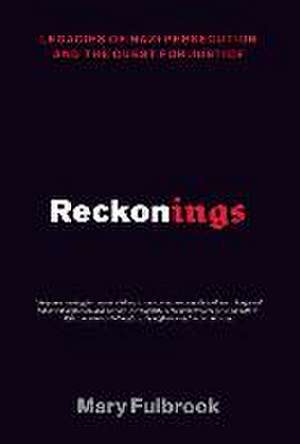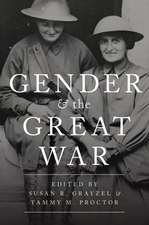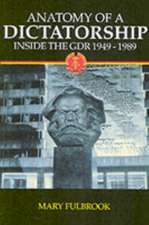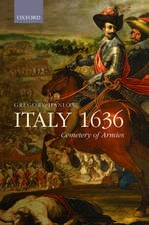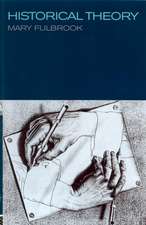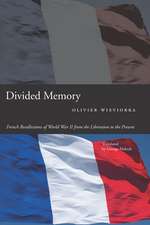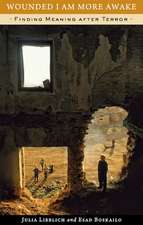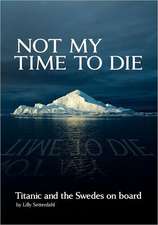Reckonings
Autor Mary Fulbrooken Limba Engleză Paperback – sep 2020
>By following the various phases of trials and testimonies, from those immediately after the war through succeeding decades and up to the present, Reckonings illuminates the shifting accounts by which both perpetrators and survivors have assessed the significance of this past for subsequent generations, and calibrates anew the scales of justice.
| Toate formatele și edițiile | Preț | Express |
|---|---|---|
| Paperback (2) | 100.88 lei 10-16 zile | +50.00 lei 7-13 zile |
| OUP OXFORD – 3 sep 2020 | 100.88 lei 10-16 zile | +50.00 lei 7-13 zile |
| HURST & CO – sep 2020 | 196.76 lei 3-5 săpt. | |
| Hardback (2) | 258.43 lei 6-8 săpt. | |
| – | 258.43 lei 6-8 săpt. | |
| Oxford University Press – 10 oct 2018 | 304.15 lei 6-8 săpt. |
Preț: 196.76 lei
Nou
Puncte Express: 295
Preț estimativ în valută:
37.66€ • 39.16$ • 31.51£
37.66€ • 39.16$ • 31.51£
Carte disponibilă
Livrare economică 22 februarie-08 martie
Preluare comenzi: 021 569.72.76
Specificații
ISBN-13: 9780197528457
ISBN-10: 0197528457
Pagini: 672
Dimensiuni: 139 x 209 x 39 mm
Greutate: 0.84 kg
Editura: HURST & CO
ISBN-10: 0197528457
Pagini: 672
Dimensiuni: 139 x 209 x 39 mm
Greutate: 0.84 kg
Editura: HURST & CO
Notă biografică
Mary Fulbrook is Professor of German History at University College London and the author of the Fraenkel Prize-winning A Small Town near Auschwitz: Ordinary Nazis and the Holocaust.
Descriere
Descriere de la o altă ediție sau format:
A single word - Auschwitz - is often used to encapsulate the totality of persecution and suffering involved in what we call the Holocaust. Yet a focus on a single concentration camp - however horrific what happened there, however massively catastrophic its scale - leaves an incomplete story, a truncated history. It cannot fully communicate the myriad ways in which individuals became tangled up on the side of the perpetrators, and obscures the diversity of experiences among a wide range of victims as they struggled and died, or managed, against all odds, to survive. In the process, we also miss the continuing legacy of Nazi persecution across generations, and across continents.Mary Fulbrook's encompassing book attempts to expand our understanding, exploring the lives of individuals across a full spectrum of suffering and guilt, each one capturing one small part of the greater story. At its heart, Reckonings seeks to expose the disjuncture between official myths about "dealing with the past," on the one hand, and the extent to which the vast majority of Nazi perpetrators evaded justice, on the other. In the successor states to the Third Reich-East Germany, West Germany, and Austria - the attempts at justice varied widely in the years and decades after 1945. The Communist East German state pursued Nazi criminals and handed down severe sentences; West Germany, seeking to draw a line under the past, tended toward leniency and tolerance. Austria made nearly no reckoning at all until the 1980s, when news broke about UN Secretary General Kurt Waldheim's past. Following the various periods of trials and testimonials after the war, the shifting attitudes toward both perpetrators and survivors, this major book weighs heavily down on the scales of justice.The Holocaust is not mere "history," and the memorial landscape covering it barely touches the surface; beneath it churns the maelstrom of reverberations of the Nazi era. Reckonings uses the stories of those who remained below the radar of public representations, outside the media spotlight, while also situating their experiences in the changing wider contexts and settings in which they sought to make sense of unprecedented suffering. Fulbrook uses the word "reckoning" in the widest possible sense, to evoke the consequences of violence on those directly involved, but also on those affected indirectly, and how its effects have expanded almost infinitely across place and time.
A single word - Auschwitz - is often used to encapsulate the totality of persecution and suffering involved in what we call the Holocaust. Yet a focus on a single concentration camp - however horrific what happened there, however massively catastrophic its scale - leaves an incomplete story, a truncated history. It cannot fully communicate the myriad ways in which individuals became tangled up on the side of the perpetrators, and obscures the diversity of experiences among a wide range of victims as they struggled and died, or managed, against all odds, to survive. In the process, we also miss the continuing legacy of Nazi persecution across generations, and across continents.Mary Fulbrook's encompassing book attempts to expand our understanding, exploring the lives of individuals across a full spectrum of suffering and guilt, each one capturing one small part of the greater story. At its heart, Reckonings seeks to expose the disjuncture between official myths about "dealing with the past," on the one hand, and the extent to which the vast majority of Nazi perpetrators evaded justice, on the other. In the successor states to the Third Reich-East Germany, West Germany, and Austria - the attempts at justice varied widely in the years and decades after 1945. The Communist East German state pursued Nazi criminals and handed down severe sentences; West Germany, seeking to draw a line under the past, tended toward leniency and tolerance. Austria made nearly no reckoning at all until the 1980s, when news broke about UN Secretary General Kurt Waldheim's past. Following the various periods of trials and testimonials after the war, the shifting attitudes toward both perpetrators and survivors, this major book weighs heavily down on the scales of justice.The Holocaust is not mere "history," and the memorial landscape covering it barely touches the surface; beneath it churns the maelstrom of reverberations of the Nazi era. Reckonings uses the stories of those who remained below the radar of public representations, outside the media spotlight, while also situating their experiences in the changing wider contexts and settings in which they sought to make sense of unprecedented suffering. Fulbrook uses the word "reckoning" in the widest possible sense, to evoke the consequences of violence on those directly involved, but also on those affected indirectly, and how its effects have expanded almost infinitely across place and time.
Recenzii
Reckonings is an apt title for this profound enquiry into the enormity of the Holocaust and the forms of justice with which it has been met ... What stands out in her scholarship and writing is the mutuality between her detailed tracking of structures and social processes, her knowledge of the vast literature on the Holocaust and her deep engagement, through extensive archival work, in the lives that produced, abetted, and suffered it - and still do.
This volume deserves prizes ... It is a sense of deep injustice, as well as horror, that will overcome readers of Reckonings: its main theme is how the overwhelming majority of those involved in the murder of an estimated six million men, women and children were either never brought to justice or were dealt with so leniently that it amounted to an insult to the victims.
The great strength of this book comes not from its revelations, but from the impact of the massive amount of information that [Fulbrook] has marshalled and the compelling way in which she has woven it together ... Mary Fulbrook has given that imbalance and failure to do justice the recognition it so well deserves. She had done so in an impressive and, if one can say so about such a depressing and distressing story, elegant fashion.
This masterly book challenges the ways, seven decades after the end of the war, that Europeans remember and commemorate a crime that still lies beyond understanding.
"[A] beautifully nuanced study ... It is not only full of fascinating facts and testimonies but it also gives one much food for thought, particularly on the subject of how populations can be swayed or manipulated even when they think they are sticking to their principles. A lesson for our and all times."
Extraordinarily well-researched, filled with heartbreaking, heroic and harrowing life stories, Reckonings is comprehensive, cogent and compelling. Fulbrook's book is a must-read for anyone interested in the realities - and the legacies - of the Nazi Past.
Well-written and impeccably researched, Mary Fulbrook's account of Nazi crime and punishment is a work of substance.
This volume deserves prizes ... It is a sense of deep injustice, as well as horror, that will overcome readers of Reckonings: its main theme is how the overwhelming majority of those involved in the murder of an estimated six million men, women and children were either never brought to justice or were dealt with so leniently that it amounted to an insult to the victims.
The great strength of this book comes not from its revelations, but from the impact of the massive amount of information that [Fulbrook] has marshalled and the compelling way in which she has woven it together ... Mary Fulbrook has given that imbalance and failure to do justice the recognition it so well deserves. She had done so in an impressive and, if one can say so about such a depressing and distressing story, elegant fashion.
This masterly book challenges the ways, seven decades after the end of the war, that Europeans remember and commemorate a crime that still lies beyond understanding.
"[A] beautifully nuanced study ... It is not only full of fascinating facts and testimonies but it also gives one much food for thought, particularly on the subject of how populations can be swayed or manipulated even when they think they are sticking to their principles. A lesson for our and all times."
Extraordinarily well-researched, filled with heartbreaking, heroic and harrowing life stories, Reckonings is comprehensive, cogent and compelling. Fulbrook's book is a must-read for anyone interested in the realities - and the legacies - of the Nazi Past.
Well-written and impeccably researched, Mary Fulbrook's account of Nazi crime and punishment is a work of substance.
Cuprins
1 Introduction: The significance of the Nazi past; Part I. Chasms: Perpetrators and victims as communities of experience; 2 The explosion of state-sponsored violence; 3 Microcosms of violence: Toil and terror; 4 Endpoints: The machinery of extermination; 5 Defining experiences; 6 Silence and communication; 7 Crossing thresholds; Part II. Confrontations: Perpetrators and victims in German courtrooms; 8 Stages of justice; 9 Redefining perpetrators: From Euthanasia to the Holocaust; 10 Major concentration camp trials; 11 The diffraction of guilt; 12 Late, too late; Part III. Connections: Constructing links between present and past; 13 Hearing the voices of victims; 14 Making sense of the past, living for the present; 15 Discomfort zones; 16 The sins of the fathers; 17 The long shadows of persecution; 18 Oblivion and memorialisation; Conclusions; 19 A resonant past
